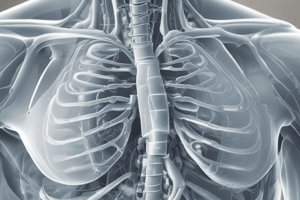Podcast
Questions and Answers
What is the first step of medical examination according to the text?
What is the first step of medical examination according to the text?
- Medical and surgical history
- History taking (correct)
- Presenting complaint
- Physical examination
What personal habits are mentioned as part of history taking for chest diseases?
What personal habits are mentioned as part of history taking for chest diseases?
- Alcohol consumption
- Both alcohol consumption and exercise routine
- Exercise routine
- Smoking and alcohol consumption (correct)
Which type of malignancies are mentioned to often metastasize to the lung?
Which type of malignancies are mentioned to often metastasize to the lung?
- Breast and colon carcinoma (correct)
- Prostate cancer
- Lymphoma
- Leukemia
Why should human immunodeficiency virus (HIV) not be overlooked during history taking for chest diseases?
Why should human immunodeficiency virus (HIV) not be overlooked during history taking for chest diseases?
What type of drug abuse may help to uncover the cause of pulmonary disorders?
What type of drug abuse may help to uncover the cause of pulmonary disorders?
Which pharmacologic agents are mentioned to have a propensity for inflicting lung damage?
Which pharmacologic agents are mentioned to have a propensity for inflicting lung damage?
What can cause nonproductive cough often following meals or with recumbancy?
What can cause nonproductive cough often following meals or with recumbancy?
Which condition is characterized by a persistent nonproductive cough with localized wheezing?
Which condition is characterized by a persistent nonproductive cough with localized wheezing?
What may cause a cough that intensifies while supine along with increased dyspnea?
What may cause a cough that intensifies while supine along with increased dyspnea?
Which of the following is likely to cause a cough associated with progressive asphyxiation?
Which of the following is likely to cause a cough associated with progressive asphyxiation?
What is characterized by purulent sputum with a foul odor?
What is characterized by purulent sputum with a foul odor?
Which condition is associated with rust-colored sputum?
Which condition is associated with rust-colored sputum?
What is the term for coughing up of blood?
What is the term for coughing up of blood?
"Exact site or location of pain" is a characteristic associated with which of the following symptoms?
"Exact site or location of pain" is a characteristic associated with which of the following symptoms?
Which part of the chest is generally associated with fever and dyspnea, with pain increasing with deep breathing or coughing?
Which part of the chest is generally associated with fever and dyspnea, with pain increasing with deep breathing or coughing?
What may often cause fever even though it is not an infectious disease?
What may often cause fever even though it is not an infectious disease?
Which condition does not cause fever, despite being a disease of the lung?
Which condition does not cause fever, despite being a disease of the lung?
What can workplace exposure to toxic air lead to?
What can workplace exposure to toxic air lead to?
What kind of history could provide important information about chronic lung diseases?
What kind of history could provide important information about chronic lung diseases?
What should patients be asked to describe using open-ended questions?
What should patients be asked to describe using open-ended questions?
What is dyspnea?
What is dyspnea?
What can cause acute dyspnea?
What can cause acute dyspnea?
What can cause chronic dyspnea?
What can cause chronic dyspnea?
What can cause acute cough?
What can cause acute cough?
What can cause chronic cough?
What can cause chronic cough?
Study Notes
- Toxic air inhalation at work is a potential cause of respiratory diseases with symptoms that may improve during weekends or periods away from work.
- Workplace exposure to toxic air can lead to pulmonary or pleural diseases and should be considered in the medical history.
- Family history of chronic lung diseases, such as cystic fibrosis, alfa-1 antitrypsin deficiency, and alveolar microlithiasis, can provide important information.
- Social history, including marital status, children, and travel history, can help in understanding the patient's respiratory symptoms.
- Smoking and alcohol history, including amount and duration, should be obtained as they are risk factors for various respiratory diseases.
- Patients should be asked to describe their symptoms using open-ended questions, including onset, duration, and any precipitating factors.
- Initial actions taken by the patient and any investigations or treatments should be documented.
- Dyspnea, or shortness of breath, is a common symptom of respiratory diseases and can be acute or chronic.
- Acute dyspnea can be caused by various conditions, including pulmonary edema, asthma, and pneumonia.
- Chronic dyspnea can be caused by chronic obstructive pulmonary disease (COPD), left ventricular failure, and pleural effusions, among others.
- Cough is another common symptom of respiratory diseases and can be acute or chronic.
- Acute cough can be caused by various conditions, including sinusitis and nasopharyngitis, and exacerbations of chronic bronchitis.
- Chronic cough can be caused by chronic bronchitis, bronchiectasis, tuberculosis, and fungal infections, among others.
- Other causes of cough include parenchymal inflammatory processes and tumors.
Studying That Suits You
Use AI to generate personalized quizzes and flashcards to suit your learning preferences.
Related Documents
Description
Learn about the importance of history taking in diagnosing chest diseases. This quiz covers the process of taking patient history and its role in making accurate diagnoses for chest-related conditions.




